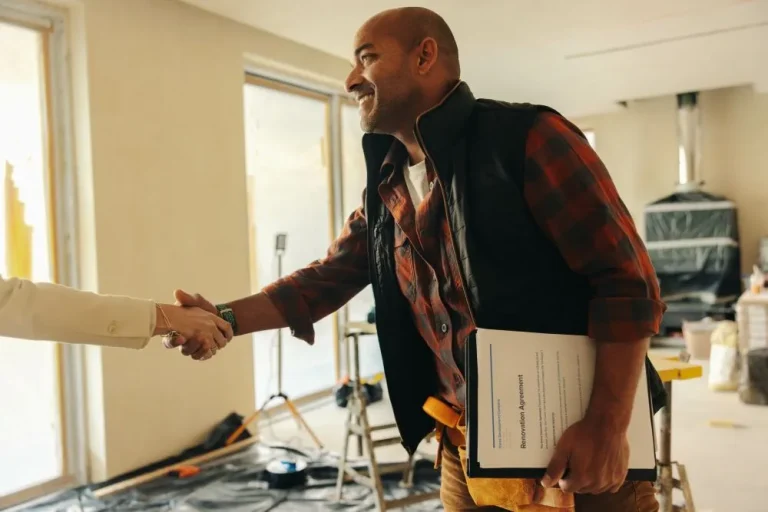As we head into spring, people start thinking about their home and their ideas for renovations. For some, it’s a small job and for others, it could be major works. It’s all in the interest of maximising their enjoyment at home – and possibly adding some extra value. After all, with mortgage rates as they stand, many are electing to modify their current home as opposed to buy a new one!
So, for tradespeople, it’s prime time to make the most of the home improvement bug, and make sure you’re the first port of call for clients and customers. But in a busy market, how can you stand out from the crowd?
With so many search sites, competitors, review and social media platforms, it can be overwhelming to know where to focus your energy. Especially as you still need to be carrying on your day job to the same high standards! So, here’s some handy tips on what potential customers could be looking for, to help you become top of their list.
Put your best boot forward
Are you portraying the best version of your business? It’s a question worth asking yourself regularly. Whether you use a website or a social media platform, such as a Facebook page, you need to have a good quality site where people can find you.
People will either be Googling ‘builders in my town’ or for your business name specifically, so it’s important they land somewhere that’s easy to understand, looks professional and has your contact details displayed clearly.
A website is also a great place to display examples of your past work, share a bit about your professional story and any accreditations and qualifications you have. We’ve got even more tips about how to set up a website here.
And when you’re meeting a potential customer in person, consider how quickly judgements can be made on first appearances. Are your vans and tools professional-looking, or could they give the impression that your work is poor quality? Of course, times are tough and we’re not recommending you go out and splurge on all new kit. But a scuffed up, dirty van or broken safety equipment might not instil confidence in a client.
Equally, the way you look and present yourself will also have an effect. Now, no-one’s expecting a builder to show up in a three-piece suit. However, looking really scruffy won’t win you much business, nor will a poor attitude. Remember, for many people, it will come down to a decision of whether they trust you – not only to do the work, but to be in their home for days, weeks or even months at a time. So, when you are meeting a new customer, be polite and friendly, yet respectful.
The power of your network
Networking can sound intimidating – but it doesn’t need to always be a formal thing. In fact, the relationships we build are key to most careers or vocations. You’ve probably been networking without realising it, with suppliers, other traders and clients. So how do you make the most of it?
Well, maintaining a good relationship with your past clients is key. Not only can they become repeat customers, thinking of you for any future projects, but they can also give you good feedback to use in your marketing materials, such as testimonials and photos.
And never underestimate the power of word of mouth. Many people take notice of recommendations from their friends and family. So, leaving a solid lasting impression with your customers will set you up for long-term reviews and future business.
On the other side, there’s your connections with other traders. If you’re a builder working on larger projects, you may need to reach out to other contractors, such as plumbers or electricians. Within the wider trade community in your area, you’re bound to have previous colleagues that you get along with, and know they do good work.
So, why not set up a referral system with another trader. That way, if a client asks for your recommendations for a roofing specialist, you can suggest someone that you trust, and know they’ll also be returning the favour for you.
The nitty gritty
One major thing that will give clients and prospective customers major peace of mind is knowing you’re properly insured as a trader. People are becoming much more savvy about this kind of thing, and if you’re not able to be clear about your cover, it could be a red flag for them.
Just as a homeowner needs to be suitably protected by their building/contents insurance, you need the right insurance in place too. Certain cover is a legal requirement:
Employer’s Liability Insurance:
If you have employees, including subcontractors, then employer’s liability insurance is a legal necessity. It covers all parties in the event that an employee is killed, injured or falls ill as a result of work. You’re legally required to be insured for at least £5 million, but most insurers offer upwards of £10 million.
Commercial Vehicle Insurance:
If you use a vehicle for work, then you need commercial vehicle insurance or ‘business vehicle insurance’ as it’s required legally, much like your normal car insurance. There are also policies that include cover for your tools and equipment, but make sure to check this with your insurer or broker beforehand.
Other cover is highly recommended, such as:
Public Liability Insurance:
While not a legal requirement, public liability insurance is one of your most vital insurance policies as a builder. It covers your legal costs and any compensation payouts should a third party make a claim against you for injury or damage to their property as a result of your work.
It can also cover medical bills, and repair and replacement costs. You can read more about why it’s so important here.
Professional Indemnity Insurance:
Even if you’re an expert in your profession, with years of experience, a client could still make a complaint about the work you’ve done for them. Professional indemnity insurance covers your legal costs and compensation if a client decides to take you to court because they believe you’ve provided inadequate services or advice.
All-Risk Cover:
All-rise cover is a comprehensive policy covers you if the work you carry out is accidentally destroyed by things like fire, flooding, or extreme weather conditions. It offers great peace of mind that your sites and materials will be protected in every eventuality.
There are consequences to not having the right insurance. If you employ staff but you don’t have employers’ liability insurance, you could face having to pay a hefty fine. Similarly, not having insurance for your commercial vehicle — or having the wrong type of vehicle insurance — could result in a penalty, as well as points on your licence.
But with the other types, you won’t face fines if you don’t have them. You may, however, be lumped with extortionate legal bills and compensation payouts, or lose money and supplies on lost work, and have to replace it all too. And if you have to take time off work with an injury or illness, you could be losing money then too.
How to make sure I’m properly insured as a tradesperson?
With any business insurance needs, it’s important to speak to an expert who can give you the advice you need. Our commercial teams at Howden Insurance can help you find the cover you need, at the right price.
Simply find your nearest commercial branch and pop by or give the team a call. They’ll be more than happy to help you get the information you need.


